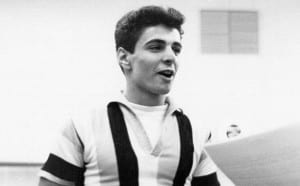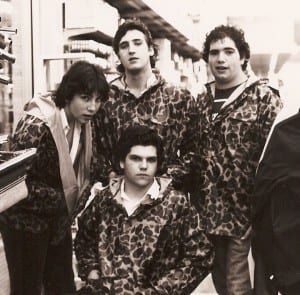Rock out Italian style in this week’s All-Star Jam!


Kids say the darnedest things!
I heartily encourage you to follow this link to a piece on School of Rock kids watching and reacting to a video by the Philadelphia band Man Man. You won’t be disappointed by following this link and reading/watching the piece. Then, let us know which future rocker(s) would make the grade in your band. Thank you for following the link to this piece.
If it’s not clear from the title of this thread, the following video is Not Safe for Work, excluding perhaps, those of you working as fishmongers and truck drivers. Take caution before clicking Play on this video.
Despite becoming a super-square and super-late-to-the-party fan of Ice Cube through his Barbershop movies and other mostly family fare Hollywood movies, I didn’t purchase any of his music until yesterday, when I bought N.W.A.‘s Straight Outta Compton album. I knew a couple of songs from that album and a couple of solo Ice Cube songs from mix CDs friends gave me through the years, and I liked them. However, I objected to supporting any band with a name containing any variation of the word nigger. Despite liking the music I heard from this crew, the band’s name and the frequent use of that word and constant cursing in their songs always struck me as that set of highly inappropriate and unnecessary things out there that I could easily avoid, much like I avoid buying a bag of pork rinds, no matter how appealing those things sometimes look to me.
Well, yesterday I bought this musical bag of pork rinds. I don’t know how or when I’ll be able to listen to this stuff. I don’t support the language, but the music is excellent. I even dig the nasty language in the context of the music, much like I dig extremely foul language and brutal violence in Martin Scorsese’s movies. For some reason, though, watching a movie with NSFW content in the company of other people doesn’t bug me. Listening to music that goes well beyond my personal rules for social engagement, however, is a more difficult hurdle for me to overcome. Why?
Is the way content is framed within a film somehow safer than the way the same content is framed within a song? We don’t drive down the street with our car projecting scenes from Taxi Driver for pedestrians and other drivers to see. Would I subject others to that if I could? I can’t imagine driving down the street blasting a song like “Straight Outta Compton.” That makes sense, doesn’t it?
When can I listen to my Straight Outta Compton album? Can I play it in my backyard with my fellow middle-age, upper middle-class white friends this weekend? Can I play it in the car, with the windows up, as I drive around with my boys, or even alone? Can I play it while I’m cooking dinner? Can I play it on my iPod while I’m working out at the gym? Do I need to beware of the people around me, in case they can hear the music bleeding through my headphones? You know, headphones aren’t my bag.
Do you see what I’m getting at? Do you run across this with certain NSFW music? I like being as free and easy as the next rock ‘n roll rebel, but are there limits?


Gerry Goffin.
As you surely know by now, lyricist Gerry Goffin, half of the legendary Brill Building songwriting team with ex-wife Carole King, died yesterday at 75 years old. I’ve got nothing profound to say other than the obvious things: he wrote many excellent songs, 75 is too young to die, he was a great…man. I especially love “Up on the Roof,” which captures the sound of the city the way rock ‘n roll songs rarely do these days.


Combat Zone.
I didn’t bother with local girls, as Graham Parker advised on Squeezing Out Sparks, at least those who weren’t already dating the new guy on my baseball team who also happened to take my primary position, first base. I was exiled to left field, about as far away as first base already felt to me in sexual terms. This guy, occupying both my bag and my local crush’s lips, was so kind and sweet I had to applaud him for both conquests.
“Don’t bother with them, they don’t bother me,” sang Parker of the local girls, but I desperately wanted to hear girls talk, as Dave Edmunds sang on another perfect record I picked up at that record store on Cottman Avenue. I did fine with adult women from all walks of life, easily harmonizing with female teachers; my Mom’s network of fun, bitter divorcees; and the women at the baby clothes manufacturer, where I worked summers. When it came to girls my own age, however, I was tone deaf. There was a trio of smart girls in my class whom I related to through student government activities. Sometimes they took pity on me in science classes and served as my lab partner. These girls inevitably carried the load on the completion of the lab report. They must have taken turns helping a few of us scientifically dense boys. Perhaps I could have gotten closer to one of these Ivory Soap girls, but as they looked me in the eye and spoke to me in a straightforward, intelligent manner, I would get distracted by the hint of nipple peeking through another girl’s shirt at the next lab counter.
As I slowly made inroads into our school’s music scene I found myself capable of having conversations with stoner girls and other malcontents of the fairer sex. Music was a bridge discussion topic to certain girls. They, too, had their favorite songs off Who and Beatles albums. They could talk about bands I didn’t quite get, like Led Zeppelin and Jethro Tull, without making that high-and-mighty “uh, heh-heh” sound that guys did. When girls loved a song they were more likely to express how the song made them feel, how the song related to something they were going through, rather than flex in the glow of the song’s empowering majesty. “This song kicks ass!” a boy was likely to shout over Zeppelin’s “Ramble On,” insinuating a transference of rock superpowers that empowered him to kick ass.
Girls didn’t lean on an artist’s credentials, the way guys did when they felt compelled to point out that a certain musician was once lauded in a Rolling Stone interview by Pete Townshend (eg, Peter Frampton, Joe Walsh) or was “classically trained.” For instance, I might ask one of my stoner friends, “What am I missing in Frank Zappa? I don’t get him.”
The guys would fire back, “Oh, Zappa’s classically trained!”
As if either of us listened to classical music.
The rare girl who liked Zappa might, instead, get to the heart of the matter and remind me of the obvious: “Well, Zappa’s pretty funny!”
For the millions of teenage boys who didn’t actually listen to classical music, the fact that upstart moronic cock-rockers like Eddie and Alex Van Halen were classically trained carried a load of weight. Talking music with girls was all right, provided I could steer them away from gushing over Jackson Browne.
What’s the deal with musicians performing barefoot? Are they not aware that a lot of electricity is surging on stage? It’s not like they’re performing on a beach. Aren’t they afraid that a clumsy bandmate might step on their foot? Or that a pointy guitar might impale a toe? What motivates any musician to go barefoot on stage? Beside a drummer, who might make the case that they have a better feel for their kick drum and hi-hat pedals when they play barefoot, does any other musician have much use for their feet beside standing on them?
I’m not the world’s most dedicated follower of barefoot fashions, but I’ve got no beef with being barefoot around the house, on the beach, or in the yard. You may have a beef with my gnarled toenails, so I don’t make a habit of going barefoot in the homes of people I don’t know well. I respect those “No shoes, no shirt, no service!” signs when I go out to dine. Why would I want to stand on an elevated stage and play guitar with my bare feet at eye level with hundreds or thousands of fans?
What’s your take on barefoot musicians? Is it cool? Sexy on anyone beside a young Linda Rondstadt? Disgusting? Do you find it distracting, as you fear for their safety? If you are a musician of any stripe, have you ever performed in bare feet?
Before we get started here, the audio from this video is NOT SAFE FOR WORK, unless you work as a fishmonger or a truck driver. Also, it’s not meant as a commentary on the man’s work. I wish these bloopers had been aired rather than what was thought acceptable for his regular Top 40 countdown broadcasts. Had that been the case, my “appreciation” of Casey Kasem would have been more glowing.
Yesterday, my son said to me, “Did you hear that the voice of Shaggy died today?”
Funny, I never thought of Casey Kasem by that role first, but it might be his most worthwhile piece of work. Even as a little kid I found his Top 40 countdown show to be the nadir of music business hack activities. It was a drag when regular broadcasting on my favorite AM station was interrupted by that guy and his info-babble. His show was the human supermarket CNN scroll of rock, long before there were monitors in public places running a constant stream of obvious and useless information.
I don’t mean to detract from Casey Kasem’s achievements as a human being, because he was likely a fantastic person to those who loved him, but I question whether his loss was in any way a significant loss to rock ‘n roll. Honestly, beside his work as the voice of Shaggy on Scooby-Doo, Where Are You!, did Casey Kasem add anything positive to your life? As a music lover was Kasem anything more than a corny guy you tolerated until regular programming resumed?

